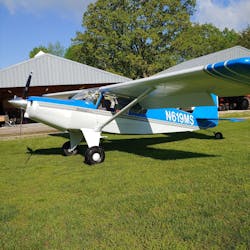Bearhawk Aircraft Introduces 6-Place Aircraft
Bearhawk Aircraft announced the introduction of its largest Bearhawk model to date, the Bearhawk 5. The new aircraft was designed by engineer Bob Barrows and is the first in the lineup of Bearhawk aircraft to use a 300-horsepower engine, seating up to six occupants.
The Bearhawk Model 5 made its first flight on May 3rd. The prototype has flown more than five hours in testing and is exhibiting excellent flight characteristics, according to test pilot Rollie van Dorn. Further flight testing is expected to confirm the airplane’s projected 3,000 lb gross weight.
The Bearhawk Model 5 has been under development for two years. Slightly wider and longer than the original 4-Place Bearhawk, the new design is powered by a spec-built Lycoming IO-580 engine. The first Bearhawk Model 5 was built in collaboration with avid Bearhawk builder Collin Campbell of Bolivar, Missouri. Collin has scratch built a fleet of different Bearhawk models and has a reputation for outstanding workmanship.
Mark Goldberg, president of Avipro / Bearhawk Aircraft, manufactures Quick Build kits of the Bearhawk models. Mark has been eager to announce the Model 5 for some time. “A brief history of how this design came about… a friend of design engineer Bob Barrows requested he create a larger version of the Bearhawk 4-Place as this friend is a big guy. Bob did the drawings for his friend who began construction on it. However, health issues forced him to quit working on the project and it sat for about a year. One day I was talking to Collin Campbell who told me he was getting bored now that his Bearhawk LSA was finished and flying.” Mark said a light bulb came on and, thus, a plan was hatched for Collin to finish the Model 5 project. “Truly, there is no one in the world, except Bob himself, more qualified to have built this prototype than Collin,” he concluded.
In many ways, the new Model 5 can be compared to the Bearhawk 4-Place the way the Cessna 185 is compared to the Cessna 180. Just like the two Cessnas, both the Model 5 and 4-Place use the same wing. The Cessna wing has 174 sq ft of surface area while the Bearhawk wing has 186 sq ft with its Riblett airfoil. Compared to the 4-Place Bearhawk, already bigger than a C-180, the Model 5 has a wider, longer fuselage and features a bigger motor. Specifically, the Model 5 is two inches wider than the Bearhawk 4-Place, and its cabin is fourteen inches longer. Overall length of the Model 5 is twenty-four inches longer than the 4-Place. There is room in the Model 5 for 5th and 6th seats in the back or, alternatively, extra cargo space. The Model 5 has considerably more interior room than a C-185.
While the Bearhawk 4-Place can use four-cylinder Lycoming engines, up to the parallel valve O-540 series, the Model 5’s smallest engine will be the six-cylinder 250/260 hp Lycoming O-540. The Model 5 has the ability to use the heavier angle-valve cylinder Lycoming O-540 and IO-580 of 300 and 315 hp respectively.
The prototype Model 5 partly owes its outstanding performance to the Lycoming IO-580 at 315 hp. A three-blade Hartzell 82-inch diameter carbon fiber Trailblazer propeller completes the package with its really strong takeoff thrust and climb. At a projected gross weight of 3,000 lb, with utility category strength at full gross, the 1,512 lb empty weight of the Model 5 results in a plane that is expected to carry double its own weight.
Cruise speeds around 160 mph are also expected as 156 mph TAS, at 3,500 ft and 24-squared, or 72-percent power, was seen during tests. Reduced, economy lean-of-peak fuel flow speeds of around 145-150 mph and 14.5 to 15 GPH are also anticipated. Takeoff performance was 220 to 300 ft. Landings were kept to under 650 ft as the wet, muddy runway conditions in the very middle of the 1,350-ft runway allowed use of only half the strip, Rollie reported. “Collin did a beautiful job building it, and he and I worked together for the three days I was there to get as much done as we could. The Bearhawk Model 5 offered no surprises on takeoff or climb out. With all that power, things happen quickly.” Rollie also noted power-on stalls to be less than 40 mph.
The Bearhawk lineup includes two-place Patrol, Companion and LSA models. The 4-Place and new Model 5 fill out the larger end of the lineup with excellent carrying capacity. All are available in kit or plans and excel at accessing remote airstrips. 2-Place and 4-Place Bearhawk kits are now shipping, including a Bearhawk 4-Place Model B shipment to New Zealand today. Bearhawk aircraft are renown for their rugged construction and large cargo areas.
For more information on Bearhawk Aircraft, visit www.bearhawkaircraft.com, or contact Bearhawk at [email protected] or 1-877-528-4776.
